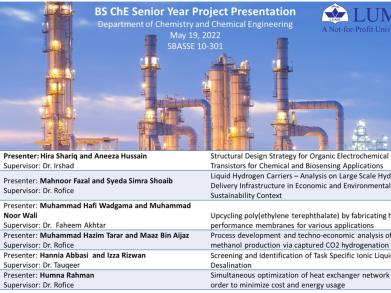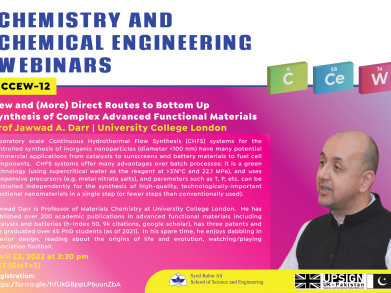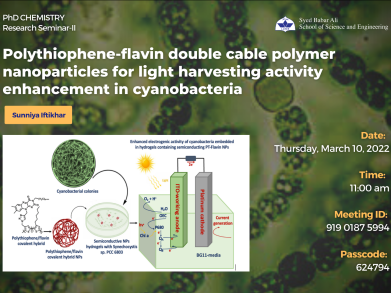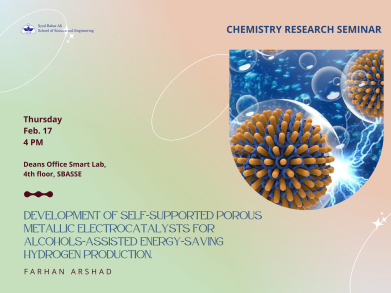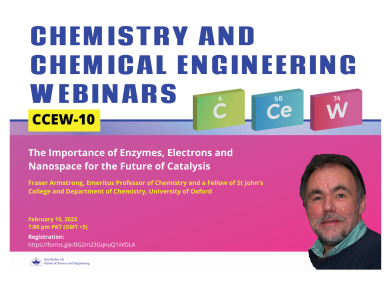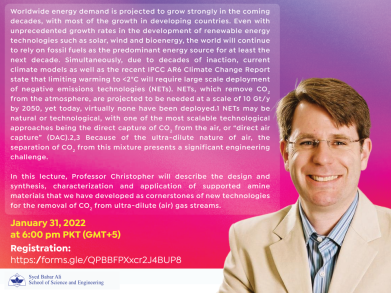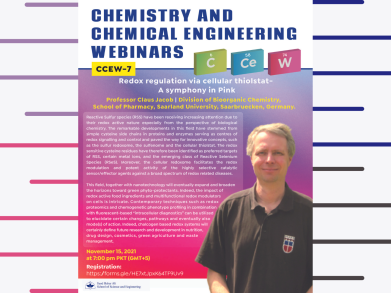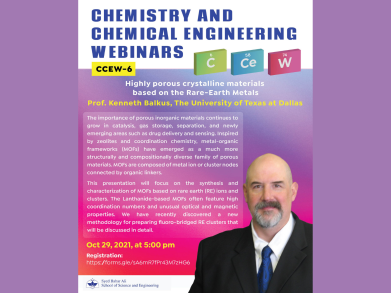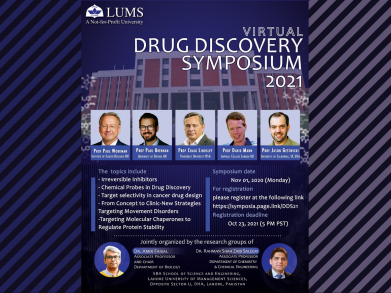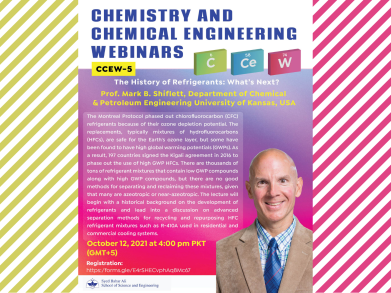
Jawwad Darr is Professor of Materials Chemistry at University College London. He has published over 200 academic publications in advanced functional materials including catalysts and batteries (h-index 50, 9k citations, google scholar), has three patents and has graduated over 45 PhD students (as of 2021). From 2016 to 2021, he was Vice Dean of Enterprise in the Maths and Physical Sciences faculty at UCL in, which he was supporting UCL’s faculty engagement with industry. He has strong research collaborations with industry and is a regular speaker at industrial forums and academic events in a wide range of topics. As well as his own latest research, he teaches on topics related to green chemistry, applications of advanced functional materials (including batteries) and at outreach lectures in the UK and overseas.
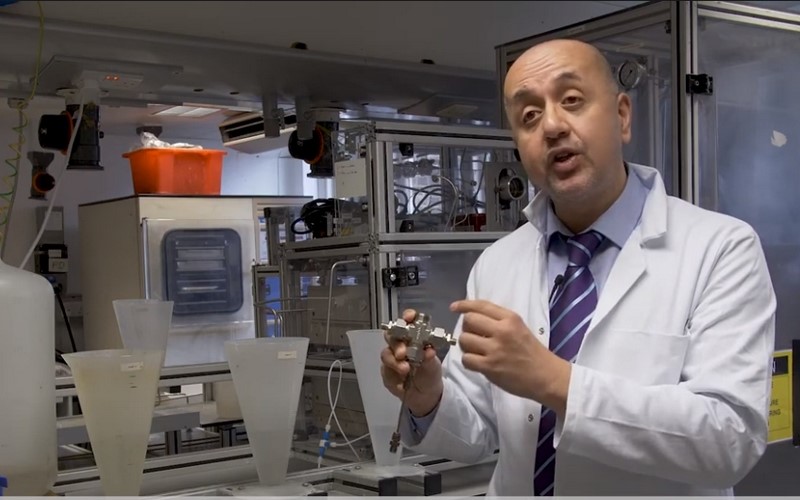
In 2017, he co-founded the UPSIGN charity (UK-Pakistan Science and Innovation Global Network; www.upsign.org.uk) that works to support, educate and connect British Pakistani and Pakistani academics. In his UPSIGN work, he is involved in public outreach workshops and lectures, training Pakistani academics and students, and developing training and workshops to support underprivileged undergraduate black and minority Asian students in research. In his spare time, he enjoys dabbling in interior design, reading about the origins of life and evolution, watching/playing association football.
Jawwad Darr is Professor of Materials Chemistry at University College London. He has published over 200…
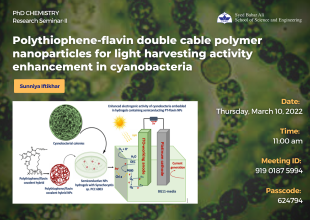
Evaluation Committee:
Dr. Basit Yameen (Supervisor)
Dr. Irshad Hussain (Thesis Committee Member)
Dr. Nauman Zafar Butt (Thesis Committee Member)
Dr. Salman Noshear Arshad (Thesis Committee Member)
Meeting ID: 919 0187 5994
Passcode: 624794
Evaluation Committee:
Dr. Basit Yameen (Supervisor)
Dr. Irshad Hussain (Thesis Committee Member)…
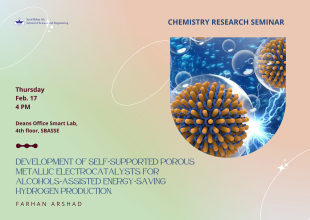
Hydrogen gas is regarded as a sustainable, environment-friendly, and promising source of energy for the future. Water electrolysis is a very attractive process for the production of H2 in which two half-reactions are involved: oxygen evolution reaction (OER) and hydrogen evolution reaction (HER) [1]. Electrocatalytic water splitting is a well-established process, but there are still several limitations for the large-scale production of hydrogen. Firstly, the most important factor is the OER reaction that requires large electrical energy and it is a kinetically slow process. Secondly, the unavoidable mixture of oxygen gas with hydrogen gas may propel the reaction to explosion in the electrolyzer. Several approaches have been suggested to reduce energy consumption and avoid the possibility of explosion. Chemical-assisted electrocatalytic water splitting is a cost-effective approach for replacing OER with a thermodynamically favorable anodic oxidation reaction in water. Electrochemical oxidation of methanol, some biomass-derived alcohols (ethyl alcohol, benzyl alcohol, and furfuryl alcohol), and carbohydrates (glucose, fructose, maltose, and sucrose) show not only high performance for hydrogen production but also produce high-value by-products. To date, noble metals such as Pt, Pd, Ir, Ru, and their alloys are the most efficient catalysts for the chemical oxidation in the chemical-assisted hydrogen evolution reaction (CAHER). Several critical challenges in the development of the CAHER system still need to be addressed such as the issue of low catalytic selectivity and efficiency toward the most valuable products in alcohol electrooxidation reactions etc. Recently, we reported 3D hierarchical porous NiCo bimetallic foams on Cu foil electrodes, prepared using a single-step bubble templating electrodeposition process, as efficient electrocatalysts for overall methanol-assisted energy-saving hydrogen production with the co-generation of valuable formate product [3]. To investigate more efficient electrocatalysts, we also synthesized nanostructured NiCu porous bimetallic foams on Cu foil electrodes by a simple, ultrafast, and single-step bubbles templating electrodeposition method. Benefiting from the excellent electronic conductivity, high internal reactive surface areas, profiting electrolyte accessibility, and effective mass transfer at the electrolyte/electrode interface, porous NiCu electrode required a cell voltage of 1.47 V to attain a current density of 10 mA cm-2 for integrating selective methanol oxidation to formate and energy-saving hydrogen production with continuous 18 h of operation. This study also emphasizes the critical role of Cu atoms in modifying the charge distribution of the Ni site and improving selectivity and instruct activity for MOR and HER.
Hydrogen gas is regarded as a sustainable, environment-friendly, and promising source of energy for the future. Water electrolysis is a very…
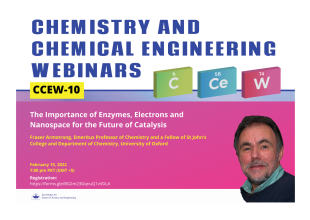
Fraser Armstrong is Emeritus Professor of Chemistry and a Fellow of St John’s College. His interests are in biological chemistry, bioenergetics and in the mechanisms and exploitation of enzymes related to energy production.
He has received a number of awards including the European Award for Biological Inorganic Chemistry, the Carbon Trust Innovation Award, the Max Planck Award for Frontiers in Biological Chemistry and the Royal Society of Chemistry Award for Interdisciplinary Chemistry.
He travels widely giving invited lectures on topics including catalysis, bioenergetics and renewable energy. He is co-editor of Energy … beyond oil which focuses on alternative energy-generating technologies.
Fraser has been elected Fellow of the Royal Society.
Fraser Armstrong is Emeritus Professor of Chemistry and a Fellow of St John’s College. His interests are in biological chemistry, bioenergetics…
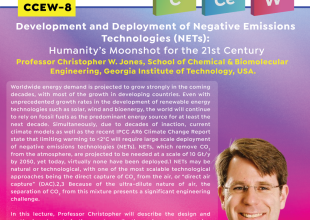
Professor Jones is the John F. Brock III School Chair and Professor of Chemical & Biomolecular Engineering at Georgia Tech. Dr. Jones leads a research group that works on materials, catalysis and adsorption. He is known for his extensive and pioneering work on materials that extract CO2 from ultra-dilute mixtures such as ambient air, which are key components of direct air capture (DAC) technologies. He also has produced an extensive body of work in catalysis. Jones’ work in both catalysis and CO2 separation has been recognized with awards from numerous organizations
Professor Jones is the John F. Brock III School Chair and Professor of Chemical & Biomolecular Engineering at Georgia Tech. Dr. Jones…
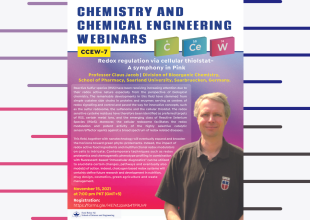
Professor Claus Jacob will be speaking about "Redox regulation via cellular thiolstat – A symphony in Pink" in the 7th session of CCEW on November 15, 2021 at 7pm PKT (GMT+5).
Professor Claus Jacob is currently associated with the Division of Bioorganic Chemistry, School of Pharmacy, Saarland University, Saarbruecken, Germany.
To join us for the session, kindly REGISTER via this link: https://forms.gle/HE7xtJpxK64TF9Uv9
About the speaker:
Prof. Jacob obtained his BSc in chemistry from the University of Leicester in 1993 and his DPhil from Oxford in 1997. From 1996 to 1999, he spent time as a Postdoc at Harvard Medical School. In 1999, he took up the lecturer position in inorganic chemistry at the University of Exeter, moved to Saarbrücken in 2005 as a junior professor, and established a research group on bioorganic chemistry in the School of Pharmacy. In June 2011, Prof. Jacob got his full professor at Saarland University.
Prof. Jacob has edited a book on 'Redox Signaling and Regulation in Biology and Medicine published by the Wiley-VCH. He was awarded a 3rd Interregional Research Prize (jointly with Prof. Kirsch and Dr. Diederich) and an award from the Foundation for the Advancement of the German-Luxemburgish cooperation in Science (jointly with Dr. Diederich).
Prof. Jacob is a fellow of Higher Education Academy and Royal Society of Chemistry (UK). He was awarded an EPSRC Advanced Research Fellow with the University of Exeter. He is the CEO of Dr. Burkholz Life Science Consulting UG (haftungsbeschränkt) and Chairman of Exeter Antioxidant Therapeutics Ltd.
Professor Claus Jacob will be speaking about "Redox regulation via cellular thiolstat – A symphony in Pink" in the 7th session of CCEW on…
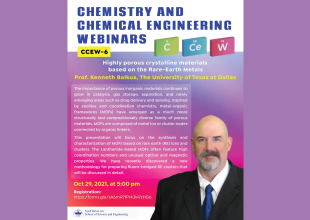
Prof. Kenneth Balkus will be talking about “CCEW-6: Highly Porous Crystalline Materials based on the Rare-Earth Metals” on 29 October 2021, at 5pm.
About the speaker:
Professor Kenneth Balkus is a professor of Chemistry at the University of Texas at Dallas. He received his PhD in Inorganic Chemistry from the University of Florida. After a post-doctoral stay at the University of Pennsylvania, he started his academic career at the UTD as an assistant professor and was promoted to Professor in 1997. He is a fellow of the American Chemical Society and was awarded the US Presidential Scholar-Teacher award in 2012. Other prominent awards include NSF Presidential Young Investigator Award and ACS Doherty Award. He is the associate editor of the Journal of Porous solids and a member of the editorial board of Microporous and Mesoporous Materials.
Prof. Kenneth Balkus will be talking about “CCEW-6: Highly Porous Crystalline Materials based on the Rare-Earth Metals” on 29 October 2021, at 5pm…
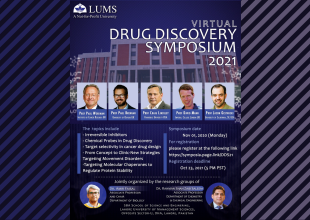
In continuation of our efforts to virtually bring the high-quality drug discovery talks to our community of learners, we are organizing Virtual DRUG DISCOVERY SYMPOSIUM 2021 (vDDS2021) on November 01, 2021, 5 PM (Monday).
This symposium will host a panel comprising of some of the top experts working at the frontiers of drug discovery. We are sure that their work and insights will pique your interest and instill a fascination for the field. This event is organized by the research groups of Dr. Rahman Shah Zaib Saleem (Department of Chemistry and Chemical Engineering) and Dr. Amir Faisal (Department of Biology) of SBASSE LUMS.
Topics of the event include:
- Irreversible inhibitors
- Chemical probs in drug discovery
- Target selectivity in Cancer drug design
- From-concept-to-clinic: new strategies targeting movement disorders
- Targeting molecular chaperones to regulate protein stability
Our exciting lineup of speakers include:
- Prof. Craig W. Lindsley (Vanderbilt University, Editor-in-Chief Journal of Medicinal Chemistry)
- Professor Paul Workman (Chief Executive and President, Institute of Cancer Research UK)
- Prof. Jason Gestwicki (University of California, San Francisco, USA)
- Prof. Paul Brennan (Oxford University)
- Prof. David Mann (Imperial College London)
Registrations are open till October 23, 5 PM (Pakistan Standard Time)
For more information please visit: https://sbasse.lums.edu.pk/drug-discovery-symposium
In continuation of our efforts to virtually bring the high-quality drug discovery talks to our community of learners, we are organizing …
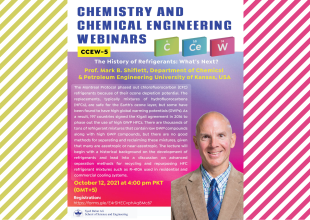
Professor Mark B. Shiflett will be talking about “The History of Refrigerants: What’s Next?” in the next CCEW-5 organized by the Department of Chemistry & Chemical Engineering at SBASSE, LUMS. The session will take place via Zoom on October 12, 2021, at 4:00 pm PKT (GMT+5).
Professor Mark B. Shiflett is currently working at the Department of Chemical and Petroleum Engineering at the University of Kansas, USA.
Please REGISTER for the session via this link: https://forms.gle/E4rSHECvphAq8Mc67
About the speaker:
Mark B. Shiflett is a Distinguished Foundation Professor in the Department of Chemical and Petroleum Engineering at the University of Kansas (KU). Professor Shiflett joined KU as a Foundation Professor in August 2016 after retiring from the DuPont Company. Professor Shiflett worked for DuPont for 28 years and was a Technical Fellow in the Central Research and Development organization which is located at the Experimental Station in Wilmington, Delaware. Professor Shiflett was also an adjunct professor at the University of Delaware in the Department of Chemical and Biomolecular Engineering. Professor Shiflett received his Ph.D. and M.S. degrees in chemical engineering from the University of Delaware in 2001 and 1998. He received his B.S. degree in chemical engineering from N.C. State University in 1989. Professor Shiflett is an inventor on 45 U.S. patents and has published 115 articles on his research in both academia and DuPont. He was awarded the DuPont Bolton Carothers award in 2005, the ACS Hero of Chemistry award in 2006 and the University of Delaware presidential citation in 2007 for his development of hydrofluorocarbon refrigerant mixtures to replace chlorofluorocarbons which were linked to the depletion of the Earth’s ozone layer. Professor Shiflett was elected in 2014 to be a Fellow in the American Institute of Chemical Engineers, in 2016 to be a Division Fellow in the American Chemical Society, and in 2018 to be a Fellow in the National Academy of Inventors for his significant professional accomplishments and contributions to the chemical engineering profession. Professor Shiflett received the American Institute of Chemical Engineers Institute award for Industrial Research in 2016 for the development of non-ozone-depleting refrigerants which have led to the healing of the Earth’s ozone layer, new applications using ionic liquids, an environmentally friendly TiO2 process and mentoring and educating chemical engineers. Professor Shiflett is a licensed professional engineer in the State of Delaware and his research at KU focuses on developing environmentally friendly, energy efficient processes and products for the chemical industry. Professor Shiflett is also the founding Editor-in-Chief of the Journal of Ionic Liquids published by Elsevier. To learn more about Professor Shiflett and his research group you can visit their website: www.shiflettresearch.com.
Professor Mark B. Shiflett will be talking about “The History of Refrigerants: What’s Next?” in the next CCEW-5 organized by the…

